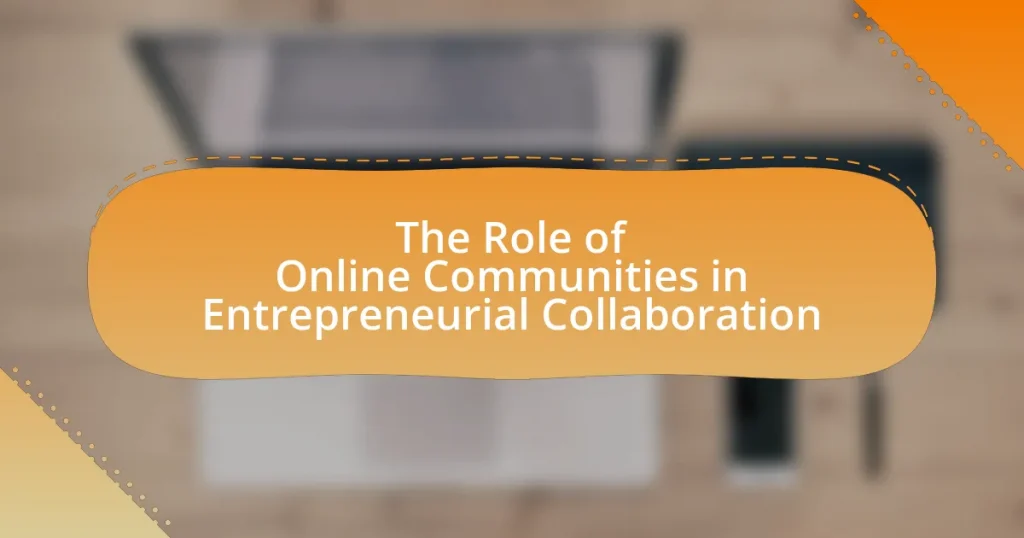The article focuses on building effective networking strategies for startup founders, emphasizing the importance of networking in achieving business success. Key strategies include leveraging industry events, utilizing social media platforms, and establishing relationships with mentors, which can provide access to resources, insights, and potential investors. The article also highlights common networking mistakes to avoid, essential skills for successful networking, and best practices for maintaining and nurturing professional connections. Additionally, it discusses the role of online platforms and tools in enhancing networking efforts, underscoring the significant impact of effective networking on startup growth and sustainability.

What are Effective Networking Strategies for Startup Founders?
Effective networking strategies for startup founders include leveraging industry events, utilizing social media platforms, and building relationships with mentors. Industry events, such as conferences and trade shows, provide opportunities for founders to meet potential investors, partners, and customers, facilitating valuable connections. Social media platforms like LinkedIn enable founders to showcase their expertise and engage with industry leaders, expanding their professional network. Additionally, establishing relationships with mentors can offer guidance and open doors to new opportunities, as mentors often have extensive networks themselves. These strategies are supported by research indicating that networking significantly increases the likelihood of startup success, with studies showing that 70% of entrepreneurs attribute their success to networking efforts.
Why is Networking Important for Startup Founders?
Networking is crucial for startup founders because it facilitates access to resources, mentorship, and potential investors. By building relationships within their industry, founders can gain insights, share experiences, and identify opportunities that may not be available through traditional channels. Research indicates that 70% of jobs are found through networking, highlighting its importance in creating connections that can lead to business growth and success. Additionally, networking can enhance a founder’s credibility and visibility, making it easier to attract talent and partnerships essential for scaling a startup.
How does networking contribute to startup success?
Networking significantly contributes to startup success by providing access to resources, mentorship, and potential investors. Through networking, startup founders can establish relationships with industry professionals who can offer valuable insights and guidance, which is crucial in the early stages of business development. For instance, a study by the Kauffman Foundation found that 70% of entrepreneurs attribute their success to networking, highlighting its importance in gaining referrals and partnerships that can lead to increased market opportunities. Additionally, networking events often serve as platforms for startups to pitch their ideas to investors, thereby increasing their chances of securing funding.
What are the risks of neglecting networking?
Neglecting networking poses significant risks, including limited access to opportunities, reduced visibility in the industry, and a lack of support during challenges. Without a robust network, startup founders may miss out on potential partnerships, funding sources, and valuable mentorship, which are crucial for growth and sustainability. Research indicates that 70% of jobs are found through networking, highlighting the importance of connections in career advancement. Additionally, a weak network can lead to isolation, making it difficult for founders to navigate obstacles or gain insights from peers, ultimately hindering their startup’s success.
What Key Elements Define Effective Networking?
Effective networking is defined by key elements such as relationship building, mutual benefit, and strategic communication. Relationship building involves establishing trust and rapport with contacts, which is essential for creating a supportive network. Mutual benefit emphasizes the importance of providing value to others, fostering a give-and-take dynamic that strengthens connections. Strategic communication focuses on clear and purposeful interactions, ensuring that messages are tailored to the audience and context. These elements are supported by research indicating that strong professional networks can lead to increased opportunities and resources, as highlighted in studies by the Harvard Business Review, which found that networking can significantly enhance career advancement and business success.
What skills are essential for successful networking?
Successful networking requires strong communication skills, relationship-building abilities, and active listening. Effective communication enables individuals to convey their ideas clearly and engage others in meaningful conversations. Relationship-building skills foster trust and rapport, essential for creating lasting connections. Active listening ensures that individuals understand others’ needs and perspectives, facilitating more productive interactions. Research indicates that 85% of jobs are filled through networking, highlighting the importance of these skills in professional success.
How can startup founders identify valuable connections?
Startup founders can identify valuable connections by leveraging industry events, online networking platforms, and targeted outreach strategies. Attending industry conferences and meetups allows founders to engage with potential mentors, investors, and partners who share similar interests and goals. Online platforms like LinkedIn facilitate connections with professionals in relevant fields, enabling founders to build relationships based on mutual interests. Additionally, conducting research on key players in their industry and reaching out directly with personalized messages can lead to meaningful connections. According to a study by the Kauffman Foundation, 70% of entrepreneurs reported that networking significantly contributed to their business success, highlighting the importance of strategic relationship-building.
What Common Networking Mistakes Should Startup Founders Avoid?
Startup founders should avoid the common networking mistake of focusing solely on transactional relationships rather than building genuine connections. This approach often leads to missed opportunities for collaboration and support, as networking is fundamentally about establishing trust and rapport. Research indicates that strong professional relationships can significantly enhance business success; for instance, a study by the Harvard Business Review found that 70% of jobs are found through networking. Additionally, neglecting to follow up with contacts after initial meetings can result in lost connections and potential partnerships. Therefore, prioritizing relationship-building and consistent communication is essential for effective networking.
How can founders ensure they are making meaningful connections?
Founders can ensure they are making meaningful connections by actively engaging in networking opportunities that align with their business goals and values. This involves attending industry events, participating in relevant online forums, and leveraging social media platforms to connect with like-minded individuals. Research indicates that 70% of jobs are found through networking, highlighting the importance of building relationships in professional settings. Additionally, founders should focus on quality over quantity by nurturing relationships with key stakeholders, mentors, and peers who can provide valuable insights and support.
What are the consequences of poor networking practices?
Poor networking practices can lead to missed opportunities, reduced visibility, and weakened relationships within professional circles. When individuals fail to effectively connect with others, they may miss out on potential partnerships, funding, or mentorship, which are crucial for startup growth. Additionally, ineffective networking can result in a lack of support and resources, making it difficult for founders to navigate challenges. Research indicates that 70% of jobs are found through networking, highlighting the importance of building strong connections. Without proper networking, startup founders may struggle to establish credibility and trust, ultimately hindering their success in a competitive market.

How Can Startup Founders Build Their Network?
Startup founders can build their network by actively participating in industry events, leveraging social media platforms, and engaging in local entrepreneurial communities. Attending conferences, workshops, and meetups allows founders to connect with potential investors, mentors, and peers, fostering valuable relationships. Utilizing platforms like LinkedIn enables founders to showcase their expertise and connect with industry professionals, while joining local startup incubators or co-working spaces provides opportunities for collaboration and networking. Research indicates that 70% of jobs are found through networking, highlighting its importance in career advancement and business growth.
What Strategies Can Founders Use to Expand Their Network?
Founders can expand their network by actively participating in industry events, leveraging social media platforms, and engaging in community initiatives. Attending conferences and trade shows allows founders to meet potential partners, investors, and mentors, fostering valuable connections. Utilizing platforms like LinkedIn enables founders to connect with industry professionals and share insights, enhancing visibility and engagement. Additionally, participating in local meetups or volunteering for community projects can help founders build relationships with like-minded individuals and organizations. These strategies are supported by research indicating that networking significantly contributes to business growth and opportunities, as highlighted in studies by the Kauffman Foundation, which emphasize the importance of relationships in entrepreneurship.
How can attending events enhance networking opportunities?
Attending events enhances networking opportunities by providing a platform for direct interaction with industry professionals and potential collaborators. These gatherings facilitate face-to-face conversations, which are more impactful than digital communications, allowing individuals to establish trust and rapport quickly. According to a study by the Harvard Business Review, 85% of jobs are filled through networking, highlighting the importance of personal connections made at events. Additionally, events often feature workshops and panels that encourage knowledge sharing, further enriching the networking experience by connecting like-minded individuals with shared interests and goals.
What role do online platforms play in networking?
Online platforms serve as crucial facilitators for networking by enabling individuals to connect, collaborate, and share resources across geographical boundaries. These platforms, such as LinkedIn, Twitter, and specialized forums, provide tools for users to showcase their skills, engage in discussions, and build professional relationships. For instance, LinkedIn reports that 80% of professionals consider networking essential for career success, highlighting the importance of these platforms in fostering connections that can lead to business opportunities and partnerships.
How Can Founders Leverage Existing Relationships?
Founders can leverage existing relationships by actively engaging their network to gain resources, advice, and introductions that can accelerate their startup’s growth. By reaching out to former colleagues, mentors, and industry contacts, founders can tap into valuable insights and support that can help navigate challenges. For instance, a study by the Kauffman Foundation found that 70% of entrepreneurs credit their networks for providing essential resources and opportunities. This demonstrates that utilizing established connections can lead to increased visibility, partnerships, and potential funding sources, ultimately enhancing the startup’s chances of success.
What techniques can be used to reconnect with old contacts?
To reconnect with old contacts, utilize personalized outreach methods such as sending a tailored email or message that references shared experiences or mutual interests. This approach fosters a sense of familiarity and relevance, increasing the likelihood of a positive response. Research indicates that personalized communication can enhance engagement rates by up to 29%, demonstrating its effectiveness in rekindling relationships. Additionally, leveraging social media platforms to engage with old contacts through comments or shares can create opportunities for interaction, reinforcing connections in a low-pressure environment.
How can referrals enhance networking efforts?
Referrals enhance networking efforts by providing trusted introductions that increase credibility and open doors to new opportunities. When individuals receive referrals, they are more likely to engage with the referred person due to the established trust, which can lead to stronger professional relationships. Research indicates that 84% of people trust recommendations from friends and family, highlighting the effectiveness of referrals in building networks. Additionally, referrals can accelerate the networking process, as they often bypass initial barriers and facilitate quicker connections, ultimately fostering a more robust professional network.

What Are the Best Practices for Maintaining a Network?
The best practices for maintaining a network include regular communication, providing value, and nurturing relationships. Regular communication ensures that connections remain strong and relevant; for instance, reaching out periodically through emails or social media can keep relationships active. Providing value, such as sharing useful resources or insights, fosters goodwill and encourages reciprocity among network members. Nurturing relationships involves personal engagement, like meeting for coffee or attending events together, which strengthens bonds and enhances trust. Research indicates that strong professional networks can lead to increased opportunities and support, highlighting the importance of these practices in effective networking strategies for startup founders.
How Can Startup Founders Nurture Their Connections?
Startup founders can nurture their connections by actively engaging with their network through regular communication and collaboration. This involves reaching out to contacts via personalized messages, attending industry events, and participating in relevant online forums. Research indicates that maintaining consistent contact can strengthen relationships; for instance, a study by the Harvard Business Review found that networking is most effective when it is reciprocal, meaning that both parties benefit from the interaction. By offering support, sharing resources, and providing value to their connections, founders can foster a sense of community and trust, which is essential for long-term networking success.
What methods can be used to stay in touch with contacts?
To stay in touch with contacts, individuals can utilize methods such as email communication, social media engagement, and regular phone calls. Email allows for direct and formal communication, enabling the sharing of updates and information efficiently. Social media platforms, like LinkedIn, facilitate ongoing interactions and networking opportunities, as they provide a space for sharing professional achievements and industry insights. Regular phone calls or video meetings foster personal connections and allow for real-time discussions, enhancing relationship-building. These methods are effective as they cater to different communication preferences and can be tailored to the nature of the relationship, ensuring sustained engagement over time.
How can founders provide value to their network?
Founders can provide value to their network by sharing knowledge, resources, and connections that can help others succeed. By offering insights from their experiences, such as lessons learned from failures or successes, founders can enhance the collective intelligence of their network. Additionally, facilitating introductions between individuals who can benefit from each other’s expertise or services fosters collaboration and growth. Research indicates that networking can lead to increased opportunities; for instance, a study by the Harvard Business Review found that 70% of jobs are found through networking. This demonstrates that when founders actively contribute to their network, they not only strengthen relationships but also create a supportive ecosystem that benefits all members involved.
What Tools and Resources Can Assist in Networking?
Tools and resources that assist in networking include professional networking platforms, social media, and industry-specific events. Professional networking platforms like LinkedIn facilitate connections with industry peers and potential collaborators, boasting over 900 million users globally, which enhances visibility and opportunities for startup founders. Social media channels, such as Twitter and Facebook, allow for real-time engagement and sharing of insights, further broadening networking reach. Additionally, attending industry-specific events, such as conferences and meetups, provides face-to-face interaction opportunities, fostering deeper relationships and partnerships. These tools collectively enhance networking effectiveness for startup founders by providing diverse avenues for connection and collaboration.
What networking apps are most effective for startup founders?
The most effective networking apps for startup founders include LinkedIn, Meetup, and Slack. LinkedIn is widely recognized for its professional networking capabilities, allowing founders to connect with industry leaders and potential investors, with over 900 million users globally. Meetup facilitates in-person networking through local events tailored to specific interests, which can help founders build community connections. Slack serves as a platform for collaboration and communication within startup communities, enabling founders to engage with peers and share resources in real-time. These apps provide essential tools for networking, collaboration, and community building, crucial for the success of startup founders.
How can social media be utilized for networking purposes?
Social media can be utilized for networking purposes by enabling individuals to connect with industry professionals, share insights, and collaborate on projects. Platforms like LinkedIn allow users to create professional profiles, join relevant groups, and engage in discussions, which fosters relationships and expands professional networks. According to a 2021 survey by LinkedIn, 85% of jobs are filled through networking, highlighting the effectiveness of social media in facilitating these connections. Additionally, social media provides tools for direct messaging and content sharing, making it easier to maintain relationships and showcase expertise, further enhancing networking opportunities.
What Practical Tips Can Help Startup Founders Network Effectively?
Startup founders can network effectively by actively participating in industry events, leveraging social media platforms, and building genuine relationships. Engaging in conferences, meetups, and workshops allows founders to connect with potential partners, investors, and mentors, enhancing their visibility and credibility. Utilizing platforms like LinkedIn enables founders to showcase their expertise and engage with relevant communities. Furthermore, focusing on building authentic relationships rather than transactional connections fosters trust and long-term collaboration, which is essential for startup growth. Research indicates that 85% of jobs are filled through networking, highlighting the importance of effective networking strategies for startup success.
How can founders prepare for networking events?
Founders can prepare for networking events by researching attendees and creating a clear elevator pitch. Researching attendees allows founders to identify potential connections and tailor their conversations, increasing the likelihood of meaningful interactions. A well-crafted elevator pitch succinctly communicates the founder’s business idea, making it easier to engage others and leave a lasting impression. According to a study by the Harvard Business Review, effective networking can lead to increased opportunities and partnerships, underscoring the importance of preparation in maximizing the benefits of networking events.
What follow-up strategies should be implemented after networking?
After networking, effective follow-up strategies include sending personalized thank-you emails, scheduling follow-up meetings, and connecting on professional social media platforms. Personalized thank-you emails reinforce the connection made during networking and can include specific references to topics discussed, enhancing the relationship. Scheduling follow-up meetings allows for deeper conversations and potential collaboration, which is crucial for startup founders seeking partnerships or mentorship. Connecting on platforms like LinkedIn helps maintain the relationship and provides ongoing opportunities for engagement and support. These strategies are supported by research indicating that consistent follow-up increases the likelihood of forming lasting professional relationships, which is essential for startup success.



